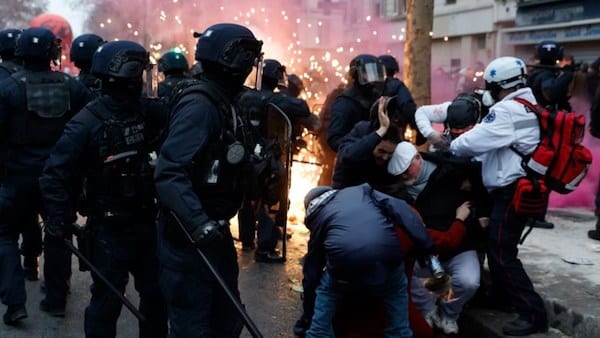As thousands of demonstrators took to the streets for a fourth round of protests against President Emanuel Macron’s planned pension reform, French police attacked them with tear gas and rubber bullets.
Nearly a million protestors marched across Paris, Nice, Marseille, Toulouse, Nantes, and other cities, reported the Interior Ministry. Local authorities estimate that over 2.5 million were on the street. The Interior Minister, Gerald Darmanin, wrote on Twitter on Friday that 10,000 police officers would be deployed to ensure security during the protests, including 4,500 in Paris.
As angry protesters set cars and trash bins on fire on a central Parisian street, police charged the crowd and dispersed them with tear gas.
The weekend demonstrations drew young people and others opposed to the pension proposals who were unable to attend the previous three days of action, which were all held on weekdays.
“It is out of question to work longer, to create the conditions for decreasing pensions, to create the conditions that would lead to my children’s not finding work, because if seniors work longer, they will block job positions. Everything is phony and bad in this reform,” a delegate representing secondary education teachers said.
Unions have warned that if the government does not meet their demands, they will “put France on hold” in the coming weeks. Strikes and protests were expected across the country, causing disruptions in public transportation, healthcare, and education, among other sectors.
Air traffic controllers at Paris’ Orly Airport went on an unscheduled strike on Saturday, canceling half of the airport’s flights.
Earlier this week, French lawmakers began debating a pension bill that would raise the minimum retirement age from 62 to 64. President Macron calls the reform “vital” for the long-term viability of the pension system, noting that workers in neighboring countries retire years later.
Raising the retirement age by two years and extending the pay-in period would result in an additional 17.7 billion Euros ($19.18 billion) in annual pension contributions, according to Labor Ministry estimates, allowing the system to break even by 2027.
Unions argue that there are other options, such as taxing the super-rich or requiring employers or well-off retirees to contribute more.
Despite polls consistently showing growing opposition to the reform and Macron’s own popularity dwindling, the French president insisted on keeping a key campaign pledge he made when he swept to power in 2017 and before his reelection in April 2022.

